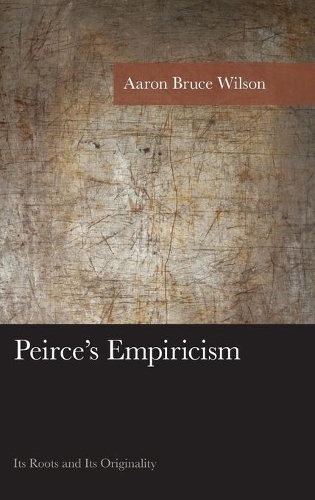
Peirce's Empiricism: Its Roots and Its Originality
(Hardback)
Publishing Details
Peirce's Empiricism: Its Roots and Its Originality
By (Author) Aaron Bruce Wilson
Bloomsbury Publishing PLC
Lexington Books
19th October 2016
United States
Classifications
Professional and Scholarly
Non Fiction
191
Physical Properties
Hardback
358
Width 161mm, Height 237mm, Spine 27mm
649g
Description
Widely praised as a founder of modern semiotics and of the pragmatist tradition in philosophy, Charles S. Peirce (1839-1914) spent over forty years developing a philosophical system that addresses the fundamental problems of Western metaphysics, epistemology, and value theory. Although never formally completed, what emerges from Peirces writings is a distinctive system that, through an innovative semiotic or theory of signs and cognition, combines a thoroughgoing form of empiricism with a robustly realist metaphysics that emphasizes the mind-independence of laws and other universals. Peirces Empiricism: Its Roots and Its Originality explains this marriage of empiricism with realism by tracing the roots of Peirces thought in the history of Western philosophy, with particular attention paid to his predecessors in the empiricist and the common sense traditions. By purging modern empiricism of its nominalistic metaphysics and its Cartesian assumptions about mind and knowledge, and by combining it with insights from sources as diverse as Duns Scotus and Charles Darwin, Peirce reinvents the idea that all our knowledge depends on sense perception while reaffirming the place of philosophy as a foundational field of inquiry. In Peirces Empiricism, Aaron Bruce Wilson defends an interpretation of Peirces philosophical work as forming a systematic whole, and develops the connections between Peirce, Reid, and the British empiricists. Wilson provides focused analyses of Peirces accounts of experience, habit, perception, semeiosis, truth, and ultimate ends. This book will be of great value to students and scholars with interests in Peirce, American philosophy more broadly, modern philosophy, and semiotics.
Reviews
Wilson devotes his first chapter to a critical survey of the history of empiricism. His survey is remarkably thorough.... [Pierce's] idea that we have to start with the methods, opinions, and prejudices we actually have, and then improve them in the course of critical inquiry, is, I think, the right one to take, and it deserves to be better known. Wilson's book will be helpful for this.... [I]t is the best, most informative book on Peirce's whole system that I have read. * Notre Dame Philosophical Reviews *
Wilsons book provides a comprehensive discussion of Peirces take on empiricism, and firmly situates him within that tradition. As such it provides a rich antidote to works that emphasize Peirces Kantian roots. Wilsons discussions of Reids influence on Peirce are particularly insightful, shedding valuable light on Peirces critical common-sensism and his take on the relation between perception and knowledge. -- Cornelis de Waal, Indiana University
In this book, Aaron Wilson attempts to reconcile the empiricist, naturalist tendencies in Peirce with his more speculative metaphysical leanings. He makes a strong argument against the traditional two-Peirce view of many scholars in favor of one that sees his metaphysical theses as empirical hypotheses, supported by evidence from the natural and psychological sciences of his timea scientifically-informed philosophy. In this regard, his objective idealism is not so much a speculative effort as an interesting empirical abduction. Wilson argues convincingly that the result is a distinctive form of empiricism that avoids many of its more traditional and persistent problems. -- James Jakb Liszka, State University of New York, Plattsburgh
Author Bio
Aaron Bruce Wilson is instructor and assistant chair in philosophy at South Texas College.
